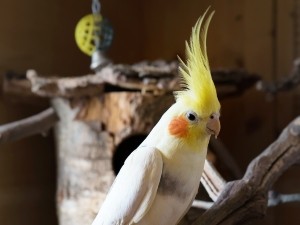
The only animals that have vents are birds, the vent is a small opening towards the bottom of the bird that is an opening for the bird’s intestinal tract and reproductive tract.
This article is a look into why your cockatiel may be rubbing its vent.
Table of Contents
Cockatiel rubbing vent:
The vent is a very important organ for your cockatiel, this organ helps the bird reproduce and also release its waste products.
If you notice that the bird is doing something odd with regard to its vent, if it starts to rub its vent, you’d surely be confused as to why this is happening.
This is why your cockatiel is rubbing its vent:
Vent rubbing:
A cockatiel that is rubbing its vent is trying to masturbate. If your bird is hormonal, or is in the mood to mate, but can’t, then the bird will rub its vent
The bird can rub its vent on almost anything, on its perch, on your arms, on its toys, or anything else that holds still for that matter.
Both male and female cockatiels will rub their vents against things. While this is more common in male cockatiels, female cockatiels will also rub their vents if they are in the mood.
Your bird may even go as far as making sounds as they do this, this indicated that the bird is getting satisfaction out of this.
This practice is more common in male cockatiels who are around prepubescent age and is more common in small birds like parakeets and cockatiels
What to do:
While this isn’t unhealthy or irregular, you likely don’t want the bird rubbing its vent on your arm, shoulder, or anywhere on your body.
If your bird starts rubbing on you then gently shake or move your arm around, this will make it difficult for the bird to keep doing this.
If you don’t stop this behavior when it is done to you then the bird will think that doing this to you is ok and the bird will continue to do this. This is not a one-time behavior.
You can also distract the bird when it starts doing this. Distract the bird by scratching around the bird’s head.
Avoid sexually arousing the bird even more, sexually arousing the bird can be as simple as petting, stroking, or scratching the bird at its rump, back, and hind end. This will make it want to rub its vent even more.
You can also distract the bird by giving it toys to play with when it starts to do this or by giving the bird treats to eat when it stops rubbing.
Punishing the bird when it starts to do this is not advised, the bird will not understand why it is being punished. The only thing punishing will do is make you seem like a threat to the bird.
If the bird seems to be rubbing too frequently, daily, then you may have to take the bird to the vet for an assessment.
Worms:
Worm infections are common in companion birds and one symptom of worms in your bird is the rubbing of its vent.
The worms may be causing your bird’s vent to start to itch and your bird relieves itself by rubbing its vent.
Not only can the parasites cause your bird’s vent to become itchy, the parasites can also cause the bird to become seriously ill depending on what your bird is infected with.
What to do:
If you suspect that the reason for your bird’s itchy vent is worms then taking your bird to the vet is advised.
The vet will be able to run tests on the bird to figure out what exactly is the matter with your bird and what parasite it was infected with.
If you enjoyed this article then you may also be interested in other bird related articles. Here are some articles that you may be interested in: Conure Beak Problems, Why Is My Bird’s Beak Cracking, Conure Beak Cracking, Will Male And Female Budgies Always Mate, Bird Poops In Food Bowl, How Do I Know If My Budgie Is Eating Enough?, Pigeon Vomiting Green, Why Is My Parakeet Laying In His Food Dish

